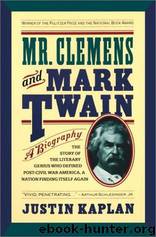Mr. Clemens and Mark Twain: A Biography by Justin Kaplan

Author:Justin Kaplan
Language: eng
Format: mobi, epub
Publisher: Simon & Schuster
Published: 2008-06-29T22:00:00+00:00
IV
Also returning from a stay abroad in the autumn of 1879 was another American anomaly. The life of Ulysses Grant, like Mark Twain’s, had been a saga of the unpredictable and the unlikely, of a man without promise who, after years of drift, failure, alcoholism, and disgrace, was touched by history and the Holy Ghost and achieved greatness. “Useless” Grant, an unprepossessing man who turned out to have the powers of a giant, was an archetype that never ceased to fascinate Mark Twain, also a twice-born man, who could never explain his own gifts and powers and who wrote a book about Joan of Arc, an ignorant country girl who had the unaccountable military genius of a great general like Grant. This strange, brooding man took Vicksburg, but he could not stand the sight of rare meat. He was imperturbable and almost expressionless, but as a commander he had unequaled charisma. Even Sherman, a nonbeliever, said that he fought under Grant with “the faith a Christian has in his Savior.” To the North, during the war years, Grant seemed God’s tool, but, like Mark Twain, he was God’s fool as well: his cabinet officers betrayed him, he demeaned himself with Jay Cooke, and he was later to be the cat’s paw and victim of his Wall Street partner, the swindler Ferdinand Ward.
Since May 1877 Grant and his family had traveled through Europe and the Orient sightseeing, collecting souvenirs and addresses of welcome, and, as they came into conflict with the protocol of courts and royalty, spreading a peculiarly democratic brand of consternation. At Windsor, young Jesse Grant had insisted on his right to dine with his parents at Victoria’s table, given her an ultimatum through her master of the household, bent her to his will, and then celebrated his victory over a bottle of her brandy. Ulysses Grant at the age of fifty-seven came back to America rehabilitated by time, absence, and foreign celebrity, and he shone with some of the old heroic fire. He seemed once again, as Sherman was to say, “the typical hero of the great Civil War.” The scandals and the plain ineptitudes of his two disastrous terms in office were now forgotten sufficiently for there to be open talk of a third term for him in 1880. Their fervor fanned by the waving of the bloody shirt, Republican stalwarts (including the desouthernized Mark Twain) who had once been mortified by President Grant now offered up three cheers. The cheers were not for the “Let Us Have Peace” Grant of the White House but for the pre-political Grant of Fort Donelson, Vicksburg, Spottsylvania, and “Unconditional Surrender” (a phrase with his own initials as well as his country’s, it was pointed out). In November Grant made his way to Chicago, where, in the course of a week-long patriotic and military celebration, he was to be welcomed home by Sheridan and Sherman and by eighty thousand men marching under ten thousand banners. The city belonged to its “Man
Download
Mr. Clemens and Mark Twain: A Biography by Justin Kaplan.epub
This site does not store any files on its server. We only index and link to content provided by other sites. Please contact the content providers to delete copyright contents if any and email us, we'll remove relevant links or contents immediately.
| Actors & Entertainers | Artists, Architects & Photographers |
| Authors | Composers & Musicians |
| Dancers | Movie Directors |
| Television Performers | Theatre |
Cecilia; Or, Memoirs of an Heiress — Volume 2 by Fanny Burney(31931)
Cecilia; Or, Memoirs of an Heiress — Volume 3 by Fanny Burney(31920)
Fanny Burney by Claire Harman(26585)
We're Going to Need More Wine by Gabrielle Union(19023)
Plagued by Fire by Paul Hendrickson(17394)
All the Missing Girls by Megan Miranda(15899)
Cat's cradle by Kurt Vonnegut(15312)
Bombshells: Glamour Girls of a Lifetime by Sullivan Steve(14041)
For the Love of Europe by Rick Steves(13836)
Leonardo da Vinci by Walter Isaacson(13295)
4 3 2 1: A Novel by Paul Auster(12358)
The remains of the day by Kazuo Ishiguro(8956)
Adultolescence by Gabbie Hanna(8904)
Note to Self by Connor Franta(7659)
Diary of a Player by Brad Paisley(7540)
Giovanni's Room by James Baldwin(7307)
What Does This Button Do? by Bruce Dickinson(6188)
Ego Is the Enemy by Ryan Holiday(5398)
Born a Crime by Trevor Noah(5361)
